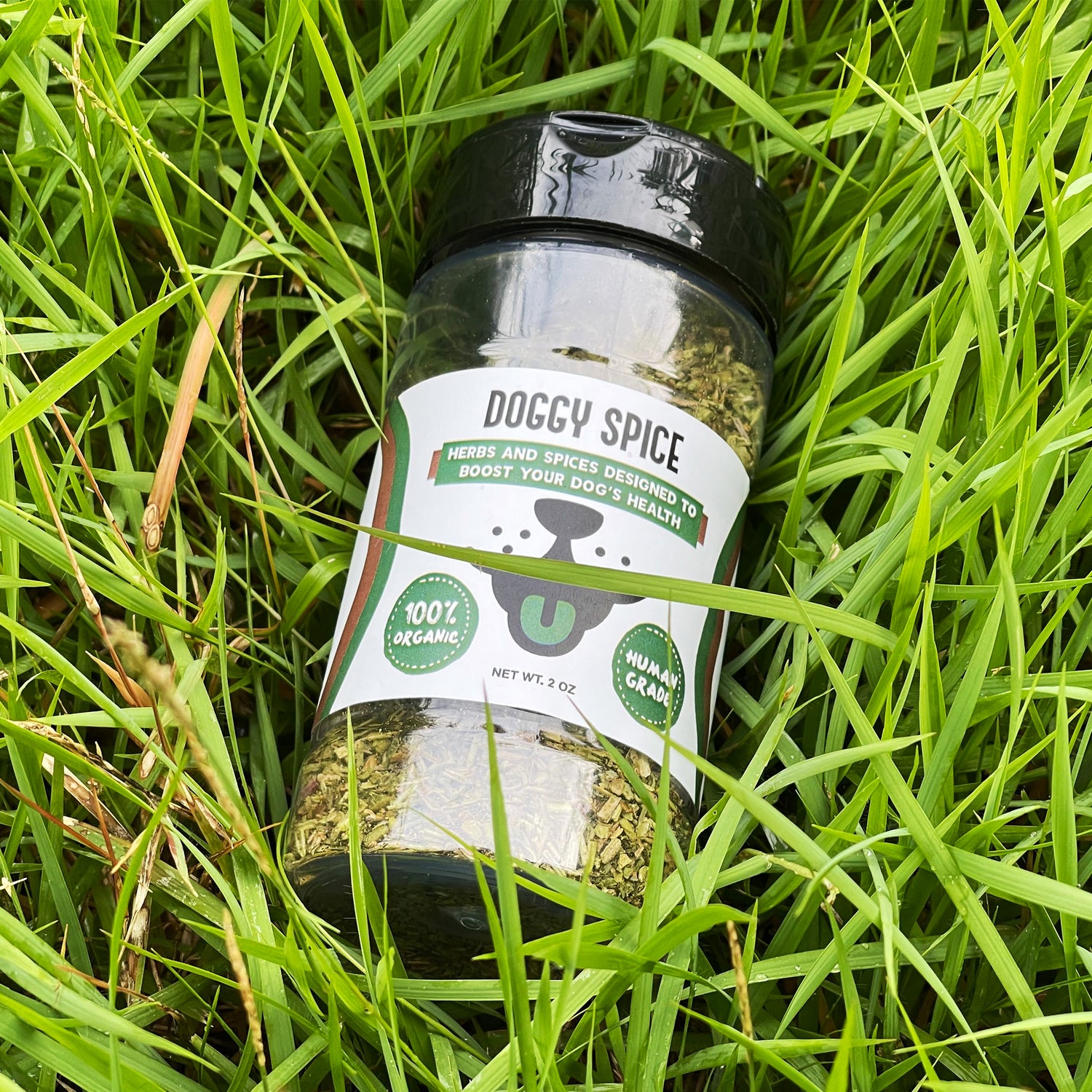
Is Thyme Safe for Dogs? Benefits of This Powerful Herb
Share
Introduction
Thyme, a staple in many kitchens, offers a range of health benefits for dogs, from supporting digestion to providing antioxidants. 🌱 In this guide, we'll explore how thyme can positively impact your dog's health, as well as key information about dosage, potential side effects, and frequently asked questions about this herb's safe use.
Why is Thyme Beneficial for Dogs? 🐶🌿
Thyme is rich in essential nutrients, antioxidants, and compounds that can support various aspects of canine health. Here are some of the primary benefits:
✅ Supports Digestive Health
Promotes proper digestion and can help alleviate gas, bloating, and occasional upset stomach.
✅ Antimicrobial and Antifungal Properties
Contains thymol, a natural compound that helps combat harmful bacteria, fungi, and even some parasites.
✅ Rich in Antioxidants
Helps neutralize free radicals, which can protect cells from oxidative damage and slow down aging.
✅ Immune System Boost
Provides vitamins A and C, supporting a strong immune response against infections.
✅ Respiratory Support
Known for soothing coughs and clearing mucus, thyme is beneficial for dogs with minor respiratory issues.
✅ Anti-inflammatory Benefits
May help reduce inflammation, which can be useful for dogs with arthritis or other inflammatory conditions.
Nutritional Components of Thyme 🌱
|
Nutrient |
Benefit for Dogs |
|
Vitamin A |
Supports eye health and immune function |
|
Vitamin C |
Aids immune system and acts as an antioxidant |
|
Calcium |
Essential for bone and dental health |
|
Iron |
Vital for red blood cell production |
|
Manganese |
Supports metabolism and antioxidant defenses |
|
Thymol |
Natural antiseptic and antimicrobial compound |
How to Use Thyme for Dogs 🐾
Dosage Guidelines
While thyme can be beneficial, it’s important to give it in the right amounts. Here are general dosage recommendations:
- Small Dogs (up to 20 lbs): 1/4 teaspoon of dried thyme per meal.
- Medium Dogs (20–50 lbs): 1/2 teaspoon per meal.
- Large Dogs (50+ lbs): Up to 1 teaspoon per meal.
👉 Note: Consult your veterinarian before adding thyme to your dog’s diet, especially if your dog has any existing health conditions.
Forms of Thyme
- Dried Thyme: Sprinkle on your dog’s food in the recommended dosage.
- Fresh Thyme: Finely chop a few fresh leaves and mix with your dog’s meal.
- Thyme Oil: Use only under veterinary guidance, as essential oils can be very potent.

Key Benefits of Thyme for Dogs’ Health
-
Digestive Health
- Benefit: Alleviates digestive issues such as gas and bloating.
- How It Works: Thyme has natural enzymes that help break down food, promoting smoother digestion.
-
Immune Support
- Benefit: Strengthens the immune system.
- How It Works: Vitamins A and C in thyme enhance immune response, helping dogs resist infections.
-
Respiratory Relief
- Benefit: Eases coughs and clears respiratory pathways.
- How It Works: Thymol helps loosen mucus and clear airways.
-
Anti-inflammatory Effects
- Benefit: Helps alleviate pain and discomfort related to inflammation.
- How It Works: Thymol and other compounds work to reduce inflammation, benefiting dogs with joint issues or allergies.
“Thyme contains thymol, a natural antimicrobial that inhibits the growth of bacteria and fungi, contributing to a healthier digestive and immune system” (Canine Health Foundation, 2023).
Real-Life Examples: How Dog Owners Use Thyme 🌿🐕
Many pet owners have incorporated thyme into their dogs' diets with positive results. Here are some real-life examples:
- Digestive Health Support: Some dog owners report that adding a pinch of thyme to their dog’s food has helped reduce issues like gas and bloating. This can be especially helpful for dogs transitioning to new foods or those with sensitive stomachs.
- Respiratory Relief During Allergy Season: For dogs experiencing minor respiratory issues or seasonal allergies, owners find that thyme can support clearer breathing. A small amount of thyme, especially during spring and fall allergy seasons, can help soothe irritation and reduce minor coughing.
- Immune Boost for Senior Dogs: Older dogs often benefit from thyme’s immune-boosting effects. Rich in antioxidants, thyme helps aging dogs stay active by strengthening their immune defenses and potentially slowing down age-related health issues.
Adding these real-life examples can help readers connect with the practical applications of thyme and feel more comfortable trying it out with their own pets.
Safe and Effective Ways to Incorporate Thyme in Dog Treats 🍪
Another creative way to introduce thyme into your dog’s diet is by incorporating it into homemade treats. Here are some easy thyme-infused treat ideas:
- Savory Thyme Biscuits
- Combine oats, peanut butter (xylitol-free), and a sprinkle of thyme to create a savory treat your dog will love.
- Thyme & Pumpkin Bites
- Mix canned pumpkin, flour, and a pinch of thyme to form a nutritious, digestion-friendly treat.
- Chicken & Thyme Jerky
- Create homemade chicken jerky by sprinkling a small amount of dried thyme on chicken strips before baking. This treat offers the taste of thyme while providing high protein content.
These treats are not only tasty but also a good way to control the amount of thyme your dog consumes in a day. Always ensure treats are appropriate for your dog’s dietary needs and health conditions.
Thyme Compared to Other Herbs and Their Benefits for Dogs 🌱
While thyme is beneficial for many reasons, there are other herbs that dog owners might consider. Here’s a comparison of thyme with a few other popular herbs for dogs:
|
Herb |
Primary Benefits |
Best For |
|
Thyme |
Antimicrobial, antioxidant, digestive support |
Dogs needing respiratory or immune support |
|
Parsley |
Freshens breath, high in vitamins A, C, and K |
Dogs with bad breath or in need of vitamins |
|
Basil |
Anti-inflammatory, antioxidants |
Dogs with mild anxiety or joint pain |
|
Oregano |
Antibacterial, antifungal |
Dogs with infections or needing immune support |
|
Dandelion |
Detoxifying, supports liver health |
Dogs with digestive or liver health needs |
Each herb offers unique health benefits. Thyme is a great all-rounder, but pet owners might choose different herbs depending on their dog’s specific health needs.
How Thyme Interacts with Other Dog Supplements 💊
If your dog is already taking supplements, you may wonder how thyme interacts with these additions. In most cases, thyme is safe to use alongside supplements, especially those targeting digestive and immune health. Here’s a breakdown of potential interactions:
➡️ Joint Supplements: Dogs with arthritis or joint pain often take supplements like glucosamine and chondroitin. Adding thyme might provide additional anti-inflammatory support, though it’s best to check with your vet if your dog is on multiple anti-inflammatory agents.
➡️ Vitamins: Since thyme already contains vitamins A and C, it may help complement a basic vitamin supplement. However, avoid giving excessive amounts of vitamin-rich herbs to prevent potential overdoses.
❗️Consulting with a veterinarian will help you confirm that adding thyme won’t interfere with any current supplements.
Understanding the Science Behind Thyme’s Health Benefits 🔬
Research on the benefits of thyme supports its traditional use as an antimicrobial and antioxidant-rich herb. Studies have shown that thymol, one of thyme’s main compounds, is highly effective in combating various bacteria and fungi. In lab tests, thymol has demonstrated significant activity against pathogens, making it a popular natural remedy for both humans and animals. 🐶
Moreover, antioxidants in thyme have been found to help neutralize free radicals. Free radicals can contribute to inflammation, aging, and even cancer. For dogs, regular antioxidant intake helps maintain cellular health and can slow the effects of aging on a molecular level. 👍
These findings underscore why thyme can be a valuable addition to a holistic dog health regimen. Incorporating a small amount of thyme into a dog’s diet can offer gentle, natural support for immune function and oxidative stress relief.
Additional Safety Tips When Using Thyme 🌟
When adding any new herb to your dog’s diet, safety is key. Here are some final tips:
2️⃣ Avoid Frequent Use: It’s best to give thyme occasionally rather than every day to avoid overloading your dog’s system.
3️⃣ Consider Fresh Thyme over Oil: Essential oils are highly concentrated and not recommended for regular use without veterinary supervision. Fresh or dried thyme is easier to dose safely.
Adding thyme should be a gentle enhancement to your dog’s diet rather than a primary ingredient. Following these guidelines ensures your dog can enjoy the benefits without unnecessary risks.
Thyme for Dogs Frequently Asked Questions (FAQ) 🧐
Is thyme safe for dogs?
Yes, in small amounts, thyme is generally safe for dogs. However, essential oils or concentrated forms should only be used with veterinary guidance.
Can thyme help with my dog’s allergies?
Thyme’s anti-inflammatory properties may provide relief for mild allergy symptoms. Always consult with a vet for severe allergies.
How should I prepare thyme for my dog?
Fresh or dried thyme can be added directly to your dog’s food in small amounts. Essential oils are not recommended without veterinary guidance.
Is thyme good for dogs with arthritis?
The anti-inflammatory effects of thyme may offer support for dogs with arthritis, reducing pain and improving mobility.
Can I give my dog thyme oil?
Thyme oil is highly concentrated and should only be used if recommended by a vet, as it can cause adverse effects in large doses.
🌿 Herbs and Spices To Keep Your Dog Healthy All Year
- Cleavers (Galium Aparine) - Supports lymphatic health
- Rosemary- Antioxidant-rich
- Dandelion Greens - Provides vitamins A, C, and K
- Basil - Calming properties
- Peppermint - Aids digestion
- Celery Seeds - Anti-inflammatory benefits
- Dill - Rich in antioxidants
- Oregano - Immune-supporting
- Parsley - Supports fresh breath
- Ginger - Soothes stomachs
- Tumeric - Anti-inflammatory properties
These herbs and spices can easily be incorporated into your dog’s meals with Doggy Spice to promote overall well-being. 🌱
Precautions When Using Thyme for Dogs ⚠️
While thyme is safe in moderate amounts, excessive consumption can lead to:
❗️Gastrointestinal upset: Overuse may cause stomach discomfort or diarrhea.
❗️Allergic reactions: In rare cases, dogs may have a sensitivity to thyme.
When to Avoid Thyme
❌ Pregnant or Nursing Dogs: Avoid using thyme for pregnant or lactating dogs, as the effects on puppies are not well-documented.
❌ Dogs with Bleeding Disorders: Thyme may affect blood clotting; consult a veterinarian if your dog has a clotting issue.
Conclusion
Thyme is a versatile herb with numerous benefits for dogs, from digestive support to respiratory health. With proper usage and dosage, it can be a valuable addition to your dog’s diet. Remember to consult a veterinarian before introducing any new herbs, especially if your dog has underlying health conditions.
References
Canine Health Foundation. (2023). Benefits of Thyme and Other Herbs in Dog Nutrition. Retrieved from https://caninehealth.org
American Kennel Club (AKC). (n.d.). Natural Herbs for Dogs: A Comprehensive Guide. Retrieved from https://www.akc.org
Veterinary Research Journal. (2022). “Thymol and Its Health Benefits for Pets.”

